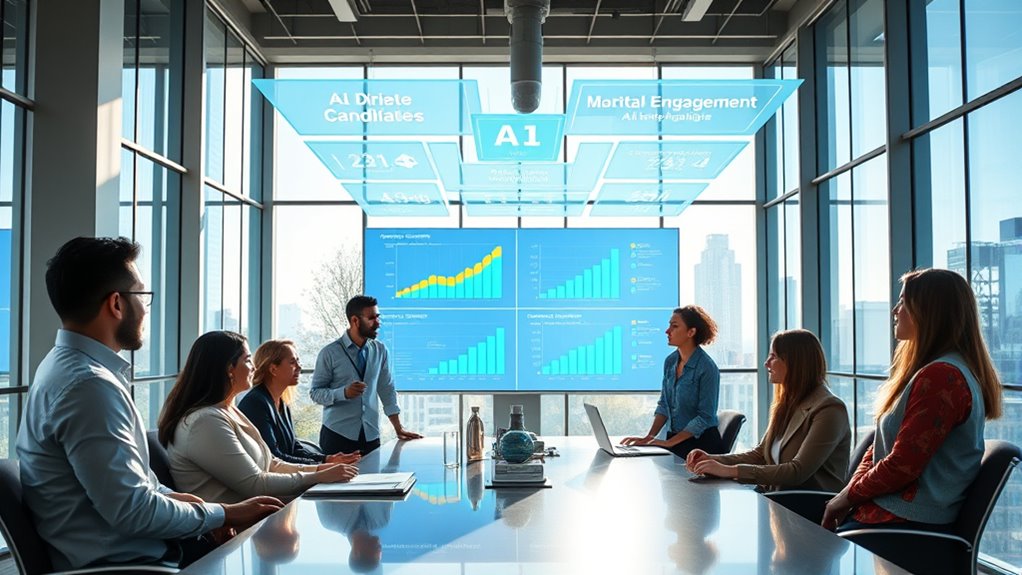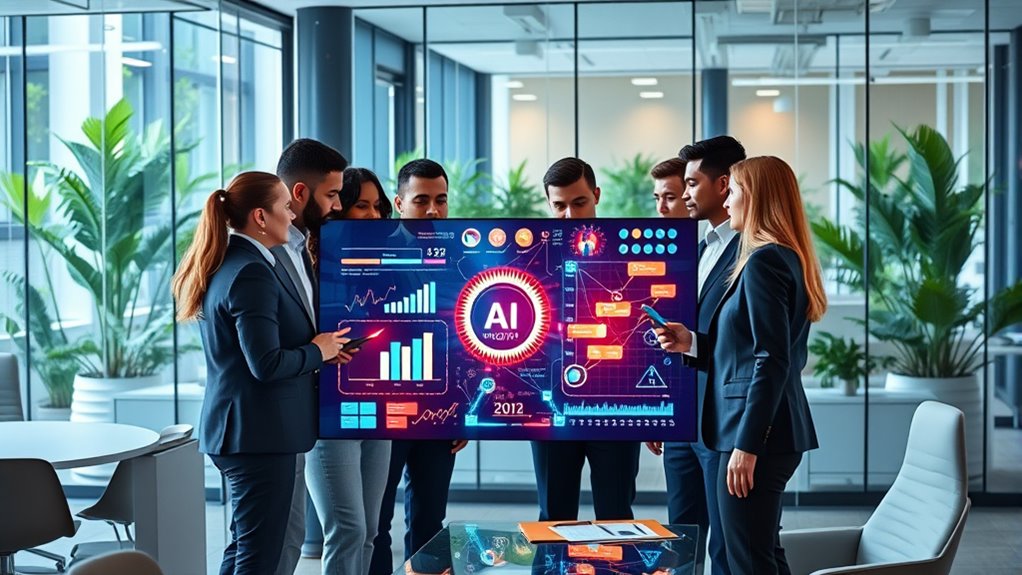Companies now use AI to revolutionize HR, marketing, customer support, and operations. AI helps you find and hire diverse talent faster, personalize marketing campaigns, and deliver instant support via chatbots. It also streamlines workflows, predicts customer needs, and boosts efficiency. With AI’s rapid growth, businesses gain a competitive edge while transforming daily tasks. If you keep exploring, you’ll discover how AI can shape your company’s future and deepen your understanding of these innovations.
Key Takeaways
- Companies use AI to streamline recruitment, reduce costs, and enhance workforce diversity through automated resume screening and bias mitigation.
- AI personalizes marketing campaigns with behavioral data, boosting engagement and customer loyalty via targeted messaging.
- AI-powered chatbots provide 24/7 customer support, improving resolution speed, satisfaction, and operational efficiency.
- Businesses leverage AI for predictive analytics to forecast demand, optimize supply chains, and identify market opportunities early.
- AI adoption enhances decision-making, reduces errors, and automates routine tasks across HR, marketing, and operational functions.
Revolutionizing Talent Acquisition and Employee Engagement

Artificial intelligence is transforming talent acquisition and employee engagement by making hiring faster, more efficient, and more inclusive. With 67% of companies increasing AI use for recruiting in 2025, you’re likely to see AI streamline your processes through predictive analytics and chatbots. These tools help reduce recruitment costs by up to 30% and cut time-to-hire by half, enabling quicker onboarding. AI also boosts diversity efforts by improving workforce representation by 35%, mitigating bias by up to 50%. You benefit from faster resume screening—75% of recruiters agree it accelerates hiring—and more accurate interview analysis, increasing hiring success by 40%. Additionally, AI’s automation of repetitive tasks allows your HR team to focus on strategic initiatives, making your recruitment process more agile and effective than ever before. Progress over perfection encourages organizations to adopt AI strategically, balancing innovation with caution to maximize benefits while minimizing risks. Unresolved issues in traditional hiring methods are often addressed more effectively with AI-driven insights, leading to more informed decision-making. Furthermore, ongoing advancements in data analytics continue to enhance the precision of recruitment strategies, ensuring better alignment with organizational goals. Incorporating AI-driven tools can also aid in identifying soul sanctuaries or places of personal growth for employees, supporting overall well-being and engagement. Additionally, integrating home improvement principles, such as creating comfortable and organized work environments, can positively influence employee satisfaction and productivity. Moreover, understanding industry-specific knowledge, like Ford Tuning, can help tailor employee training and development programs to specialized fields, fostering expertise and innovation.
Personalizing Customer Experiences Through Marketing Innovation

You can use AI to create hyper-personalized campaigns that resonate with individual customers and boost engagement. Predictive consumer insights help you anticipate needs and tailor messages before customers even express them. By leveraging these tools, you enhance the customer experience and drive better marketing results. Given that 92% of businesses plan to invest in generative AI within three years, adopting these strategies now positions you for future success growth in AI adoption. Incorporating AI content clusters enables more targeted and interconnected messaging that deepens audience engagement. Considering the importance of color accuracy in visual content, integrating AI-driven image optimization can further refine your marketing visuals and increase engagement. Additionally, utilizing personalization technology allows brands to deliver more relevant and engaging content at scale, improving overall customer loyalty. Moreover, understanding the significance of meditation in mental health can help tailor wellness-related marketing initiatives to better connect with health-conscious consumers. Exploring astrological compatibility can also offer unique insights into customer preferences and relationship building strategies.
Hyper-Personalized Campaigns
Hyper-personalized campaigns are transforming marketing by delivering tailored experiences that resonate deeply with individual customers. Using AI and machine learning, you analyze behavioral data, purchase history, and real-time factors like location and time to craft relevant messages. Consumers now expect personalized interactions; when these are missing, they often respond negatively. Personalized ads feel like conversations, creating meaningful connections and boosting engagement. This approach increases conversion rates, enhances loyalty, and provides a competitive edge. However, it requires significant resources, advanced technology, and strict data privacy measures. As companies continue to adopt hyper-personalization, they’ll leverage AI-driven insights and innovative tools to refine campaigns, ensuring they stay relevant and meet evolving consumer expectations. The result is a more meaningful, engaging customer experience.
Predictive Consumer Insights
Predictive consumer insights are revolutionizing marketing by enabling companies to anticipate customer needs and tailor experiences more effectively. By analyzing data, you can forecast consumer behavior and preferences, making your marketing efforts more targeted. Advanced analytics help you segment customers precisely, allowing personalized messaging that resonates. Predictive models use historical data to forecast actions like repeat purchases or demand for complementary products, boosting your ROI. Techniques such as social media, website, and psychographic analytics reveal insights into customer personalities and behaviors. AI and machine learning streamline these processes, integrating data from multiple sources for all-encompassing profiles. Predictive analytics not only improves conversion rates but also enhances customer satisfaction, giving your business a competitive edge through smarter resource allocation and personalized experiences. Additionally, understanding customer segmentation can help tailor marketing strategies to specific audience groups, increasing overall engagement and loyalty. Exploring behavioral insights can further refine your ability to predict and meet customer expectations with greater accuracy. Recognizing the importance of AI security can also ensure that customer data remains protected while leveraging these advanced techniques. Incorporating ethical AI practices into your strategy can help maintain consumer trust and comply with data privacy regulations. Staying informed about regulatory standards related to data privacy ensures your marketing practices remain compliant and trustworthy.
Enhancing Customer Support With Ai-Powered Chatbots

AI-powered chatbots enable you to offer support around the clock, ensuring customers get help whenever they need it. They can handle multiple inquiries at once, providing instant resolutions that boost satisfaction. By reducing wait times and resolving issues faster, chatbots make your customer support more efficient and cost-effective. Nearly 50% of customers believe AI agents can demonstrate empathy, making interactions feel more personalized and human-like. Additionally, integrating chatbots with Self Watering Plant Pots and mailing list management tools can help personalize follow-up communications and improve ongoing engagement. Leveraging predictive analytics can further optimize your support strategies by anticipating customer needs based on historical data. Incorporating anime movie themes into chatbot interactions has been shown to increase engagement, especially among younger audiences.
24/7 Support Availability
Have you ever needed support outside normal business hours? AI-powered chatbots provide 24/7 customer service, ensuring your inquiries are addressed instantly, no matter the time zone. By 2025, around 80% of companies plan to adopt these bots, boosting support availability globally. They handle multiple questions simultaneously, reducing wait times and delivering prompt responses at any hour. This continuous coverage increases customer satisfaction and relieves pressure on human agents. Chatbots respond about three times faster than humans and improve overall efficiency, handling high volumes and resolving complaints quickly. They also cut support costs by 30%, freeing resources for more complex issues. With personalized, natural conversations, AI chatbots enhance engagement, loyalty, and provide valuable insights for ongoing service improvements. Market valuation projected to reach $46.64 billion by 2029, demonstrating the rapid growth and increasing reliance on AI-driven customer support solutions.
Instant Issue Resolution
With chatbots available around the clock, customers expect rapid resolution to their issues. AI-powered chatbots respond instantly, reducing wait times and increasing satisfaction. They can quickly escalate complex problems to human agents, ensuring quick resolution. Over 69% of customers prefer using chatbots when they can solve issues faster, and 51% favor immediate service. These bots handle multiple queries simultaneously, boosting efficiency. Automated ticket management speeds up support workflows and minimizes errors, while AI diminishes resolution times by up to 50%. They manage 80% of inquiries autonomously, leading to faster resolutions and happier customers. This rapid, personalized support encourages repeat business—36% more than before—while 80% of users report positive experiences. AI chatbots ensure complaints are addressed swiftly, enhancing overall customer satisfaction.
Streamlining Business Operations and Supply Chains

How are companies transforming their operations and supply chains? They’re adopting automation solutions at a rapid pace—60% of businesses now use automation, and 56% apply AI tools to improve workflows. This shift reduces errors by 70%, boosts customer engagement, and drives growth, with over 90% of IT professionals reporting benefits. In supply chains, 70% of professionals say automation improves retention, while many see it as a way to upskill and create jobs. The market for process automation is projected to grow from $13 billion in 2024 to nearly $24 billion by 2029, with Gartner forecasting a significant rise in network automation by 2026. Overall, automation streamlines logistics, cuts costs, and allows your teams to focus on strategic initiatives.
Leveraging Predictive Analytics for Strategic Growth

Are you aware of how predictive analytics is transforming strategic growth across industries? This technology uses historical and real-time data, combined with machine learning, to forecast future trends. Its market is booming, expected to grow from $17.07 billion in 2024 to over $91.9 billion by 2032, driven by AI and IoT integration. Businesses leverage these insights to optimize processes, allocate resources efficiently, and improve customer targeting. For example, predictive analytics can forecast demand changes, identify risks, and uncover market opportunities before they happen. North America leads the charge, with startups fueling expansion. Despite high costs and data challenges, organizations increasingly adopt predictive analytics to gain competitive advantages, support sustainability, and enhance decision-making, positioning it as an essential tool for strategic growth.
Embracing AI Adoption Trends Across Industries

Across industries, AI adoption is accelerating rapidly as organizations recognize its potential to revolutionize operations and competitive advantage. Industry-wide, AI budgets grow by up to 20% annually, with sectors like healthcare, finance, media, manufacturing, retail, energy, and logistics leading the way. In healthcare and finance, AI enhances diagnostics, risk assessment, and automation. Manufacturing uses AI for predictive maintenance, while retail leverages it for customer service and personalized experiences. Energy companies optimize processes, reducing costs, and travel and logistics improve route planning and scheduling. This growth reflects a broader shift, where 92% of companies plan to boost AI investments over the next three years. With global adoption expected to expand at a CAGR of 35.9%, AI’s influence across industries continues to deepen, transforming traditional workflows and strategic approaches.
Improving Accessibility and Daily Life With Voice Assistants

Voice assistants are transforming daily life by making tasks more accessible and efficient for a wide range of users. They enable routine behaviors and provide essential support, especially for people with disabilities. For example:
- One in three consumers with visual impairments use voice assistants weekly.
- 32% of people with physical disabilities rely on them regularly.
- 27% of visually impaired individuals living alone buy groceries online each week.
- Voice technology helps users find information, play music, or complete actions effortlessly.
Ensuring Compliance and Security With AI Solutions

As voice assistants become more integrated into daily routines, organizations must also prioritize safeguarding data and guaranteeing compliance with evolving regulations. AI solutions play a crucial role here, with the market projected to reach over USD 1.3 billion by 2034. These tools focus on data protection, encryption, threat detection, and compliance reporting, helping you manage large data volumes effectively. They automate security processes, reducing costs and operational complexity. With AI, you gain real-time insights that mitigate risks and ensure adherence to strict standards. Despite slow adoption—only 18% fully utilize AI cybersecurity—its growth potential is significant. By integrating AI-driven compliance tools, your organization can stay ahead of cyber threats, maintain regulatory standards, and protect sensitive information efficiently.
The Economic Impact of AI on Business Profitability

AI boosts your business profitability by improving operational efficiency and reducing costs, often saving around 22% in processes. It also enhances decision-making, allowing you to open new revenue opportunities and stay ahead of the competition.
Increased Operational Efficiency
Implementing AI transforms operational processes, leading to significant cost savings and productivity gains that directly boost profitability. You can expect around 22% in cost reductions within a year, thanks to automation of routine tasks that cut labor costs and ease bottlenecks. Early adopters see over half of their business goals exceeded, driven by these efficiencies. Additionally, AI in supply chain and production helps reduce waste and optimize resources by more than 20%. Using machine learning and data accuracy tools, nearly half of businesses cut errors and rework costs. To summarize:
- Automating routine tasks decreases labor costs.
- Supply chain optimization reduces waste by over 20%.
- Error reduction cuts rework expenses.
- Early adopters outperform competitors financially.
These efficiencies make AI a key driver of profitability.
Enhanced Decision-Making Capabilities
Enhanced decision-making capabilities powered by AI are transforming how businesses strategize and operate, leading to considerable economic gains. With AI providing advanced analytics and insights, you can make smarter, faster choices that boost efficiency and profitability. Industries like banking, tech, and life sciences are already leveraging AI to refine underwriting, risk management, and R&D, resulting in better outcomes. Companies using AI report an 80% increase in productivity and save about 22% on process costs. Globally, AI could add up to $4.4 trillion annually to the economy and contribute $15.7 trillion by 2030. As 77% of firms explore AI, those that integrate it gain a competitive edge, driving innovation and growth that notably impacts business profitability worldwide.
Revenue Growth Opportunities
Have you ever wondered how emerging technologies can particularly boost your company’s revenue? AI’s economic impact is staggering, with generative AI alone adding $2.6 to $4.4 trillion annually across 63 use cases. By 2030, AI is expected to contribute up to $19.9 trillion to the global economy. Its influence varies across industries:
- Banking could see $200–$340 billion yearly.
- Retail and CPG sectors might gain $400–$660 billion annually.
- AI can boost productivity by up to 80%, driving efficiency.
- Corporate profits could increase by 45%, fueling growth.
These gains stem from automation, improved customer interactions, and enhanced product development, making AI an essential driver for revenue expansion.
Preparing the Workforce for an AI-Driven Future

Are your employees prepared for the rapid changes AI is bringing to the workplace? Many companies recognize the need to retrain workers, with 120 million expected to undergo reskilling in the next three years. By 2027, 42% of employers plan to focus on AI training, emphasizing its importance across industries like IT and media. Reskilling and upskilling are top priorities for 77% of businesses, aiming to help staff work alongside AI rather than be replaced. To stay competitive, you’ll need to hire talent with AI skills or those capable of integrating AI into daily tasks. However, training costs remain a challenge. Preparing your workforce now guarantees resilience to AI-driven disruption, enabling your company to adapt and thrive in an evolving digital landscape.
Frequently Asked Questions
How Does AI Ensure Ethical Use in HR and Marketing Practices?
AI guarantees ethical use in HR and marketing by implementing robust oversight, transparency, and bias prevention measures. You’re likely to see organizations forming ethics committees, continuously monitoring algorithms for bias and privacy issues, and maintaining clear communication about AI decisions. This active approach helps you trust AI-driven processes, reduces unfair practices, and ensures compliance with regulations, all while safeguarding sensitive data and promoting fairness in your workplace and marketing strategies.
What Are the Privacy Concerns Related to AI Data Collection?
You should know that AI data collection raises serious privacy concerns. It often involves gathering vast amounts of sensitive information, sometimes without your explicit consent. This can lead to data breaches and misuse, especially with biometric data like facial recognition. Consumers are increasingly worried about how their data is stored and used. Transparency and control are critical, but current regulations often lag behind AI’s rapid growth, leaving privacy gaps.
How Can Small Businesses Effectively Implement AI Solutions?
To effectively implement AI solutions, start small by automating routine tasks with low-cost or freemium tools. Focus on areas like marketing or customer support that deliver quick wins. Educate yourself and your team about available AI options, and partner with vendors offering scalable solutions. Track your results to see what works best, then gradually expand AI use across your business. This approach minimizes risk and maximizes benefits.
What Skills Will Employees Need in an Ai-Driven Workplace?
In an AI-driven workplace, you’ll need a mix of technical and soft skills. You should understand AI basics, data literacy, and how to interpret AI outputs. Adaptability is essential—stay open to learning new tools. Creativity helps you leverage AI innovatively, while emotional intelligence ensures smooth collaboration. Ethical judgment guides responsible AI use. Combining these skills will help you thrive and contribute effectively in this evolving environment.
How Does AI Impact Job Security Across Different Industries?
Have you ever wondered if AI’s rapid growth threatens your job security? Across industries, AI displaces some roles—like in tech and customer service—but it also creates new opportunities, especially in technology and data processing. You might face reduced entry-level positions or job shifts, but embracing new skills can help you adapt. Think of AI as both a challenge and a tool—your ability to evolve determines your security in this changing landscape.
Conclusion
As you embrace AI’s transformative power, remember it’s not just a tool but a partner shaping your future. It’s the silent engine propelling innovation, efficiency, and growth—like a trusted compass guiding you through uncharted waters. Stay adaptable, harness AI’s potential wisely, and you’ll open opportunities that once seemed out of reach. After all, in the race of progress, those who innovate lead the way—will you be among them?









